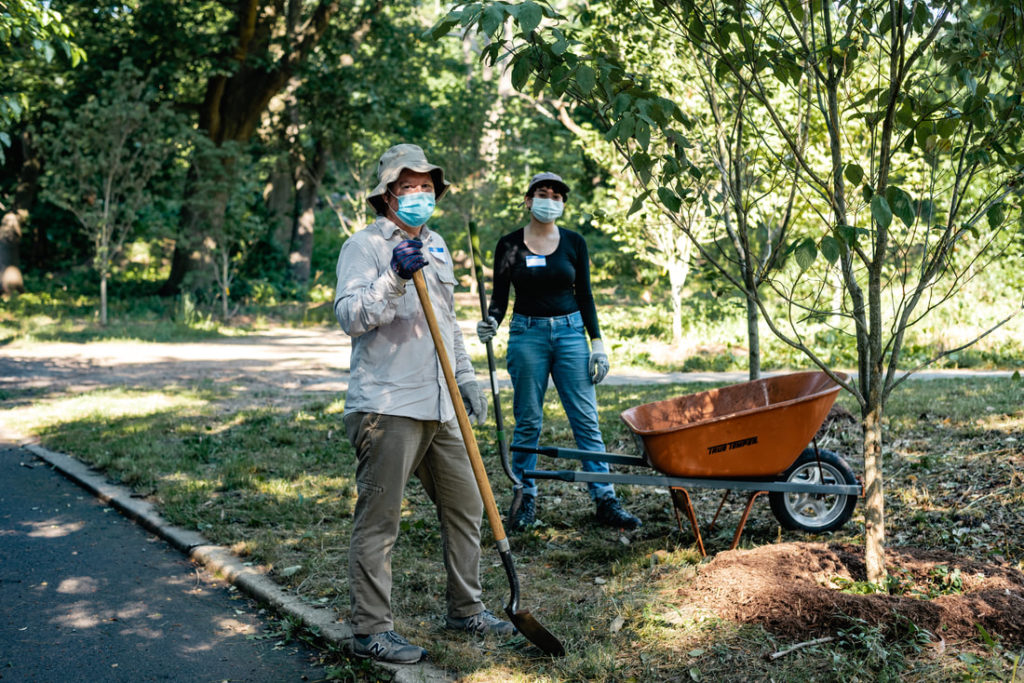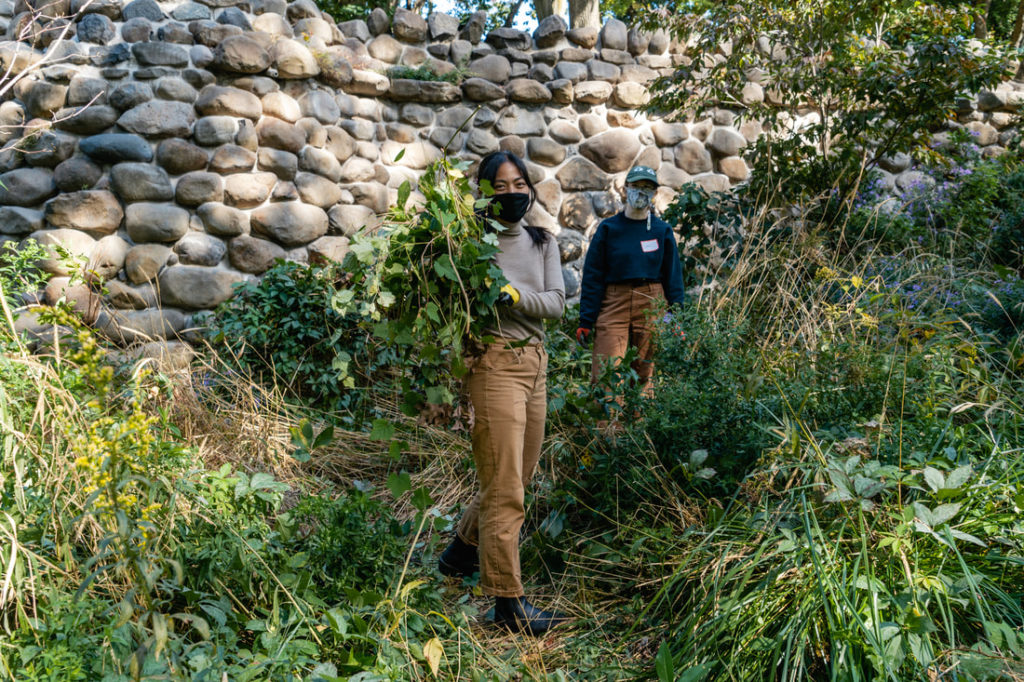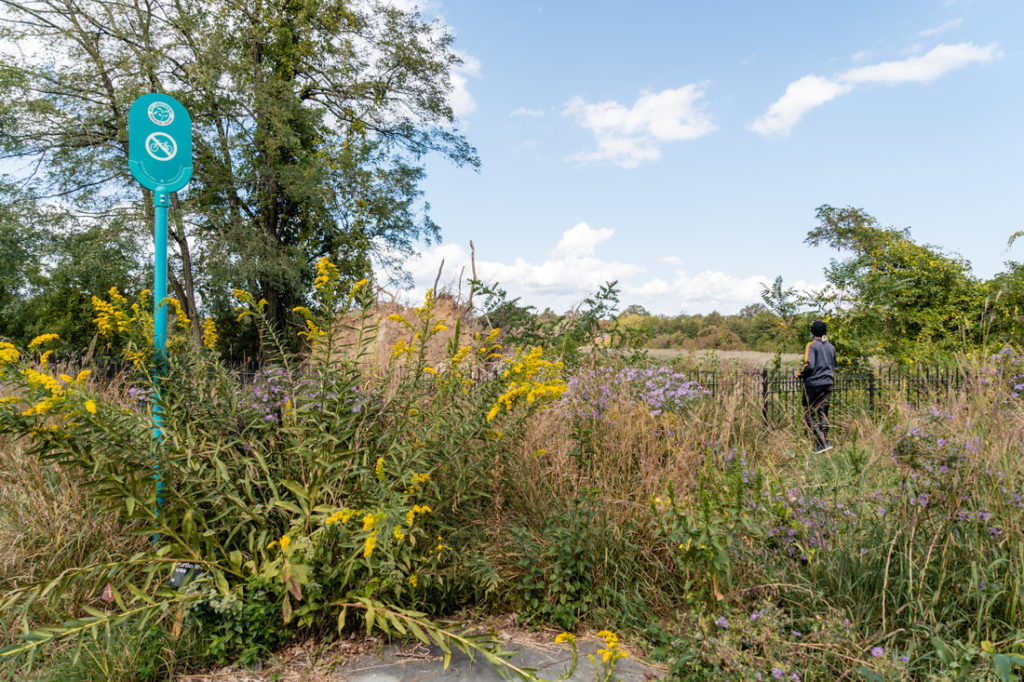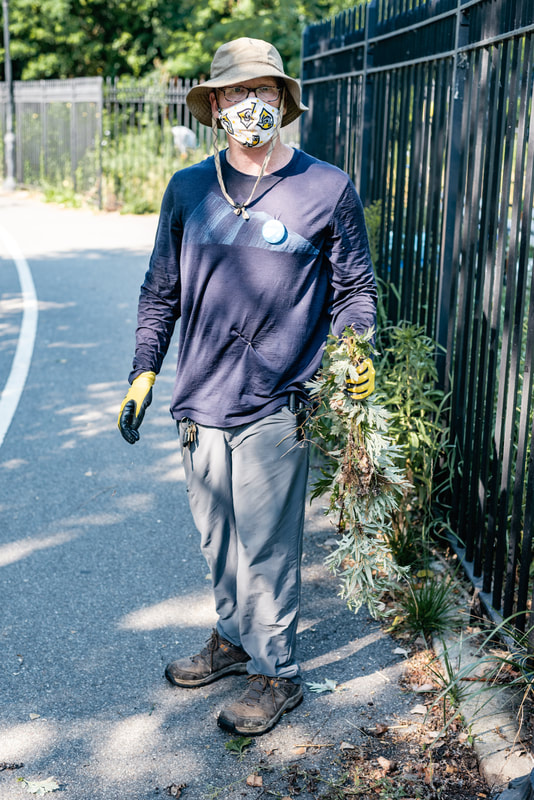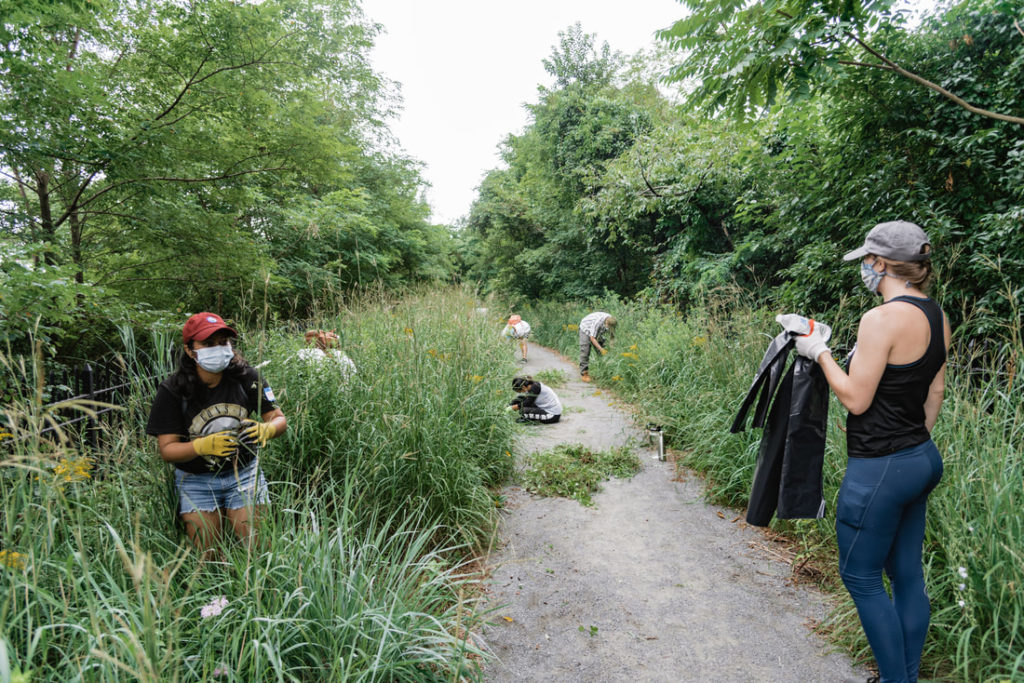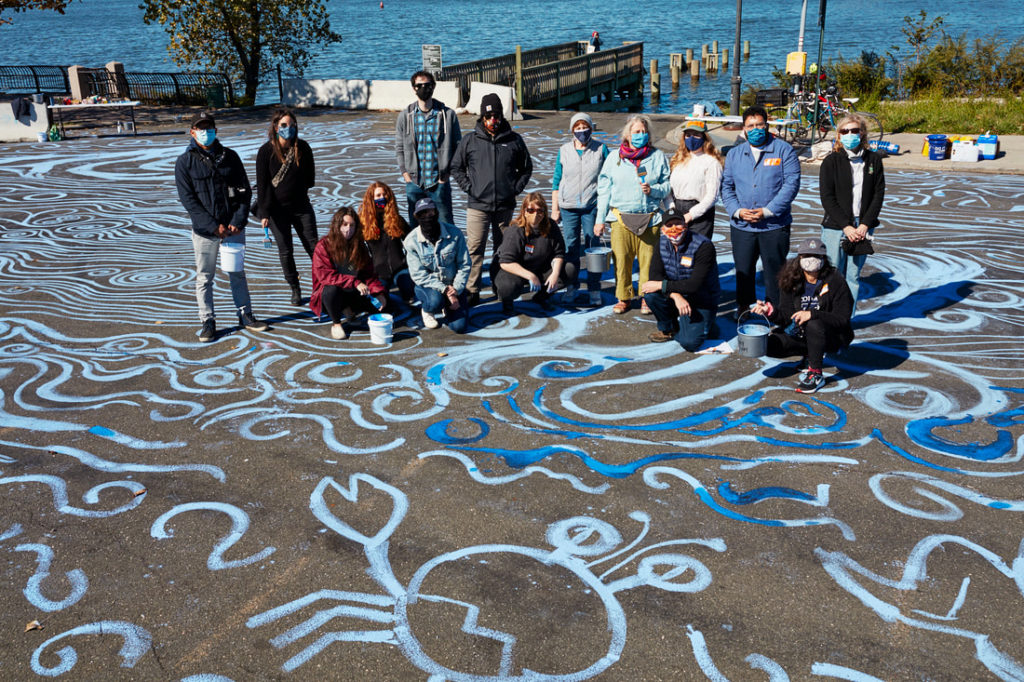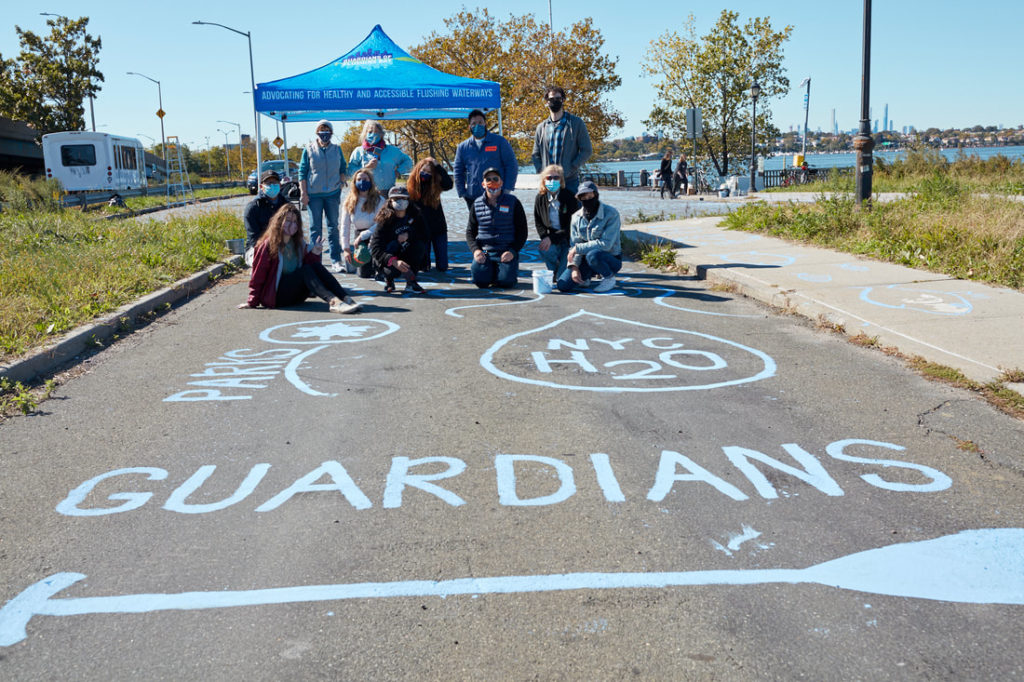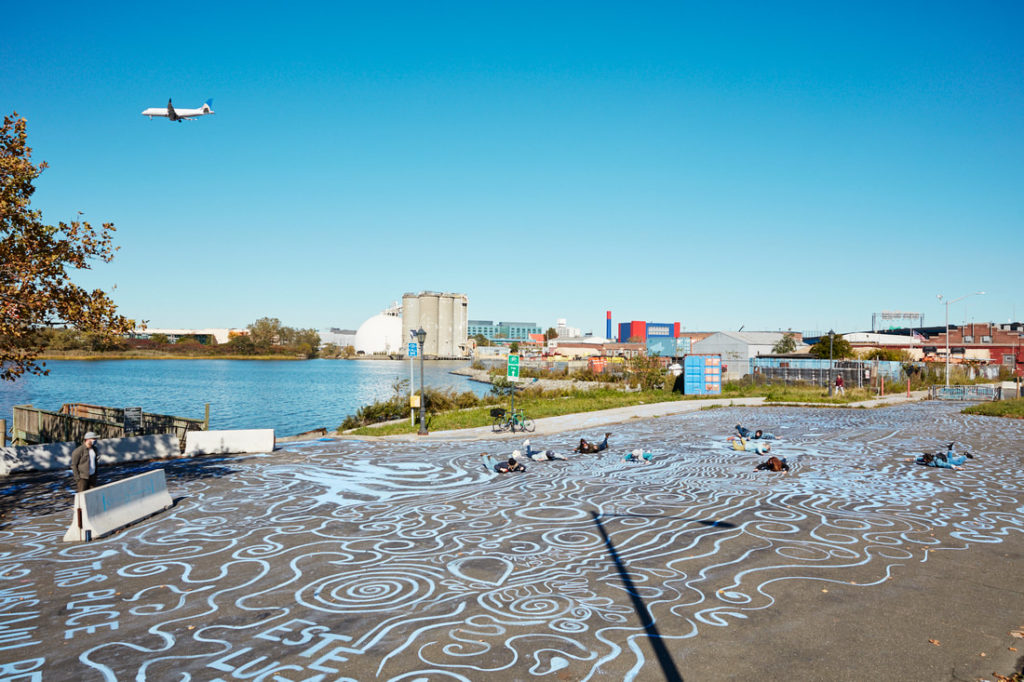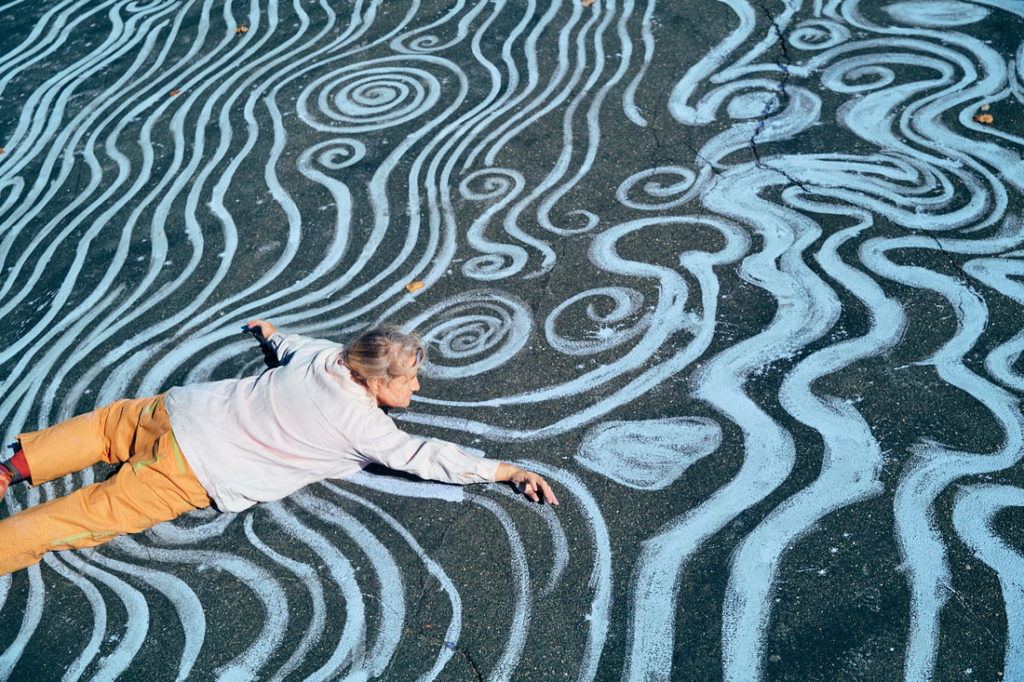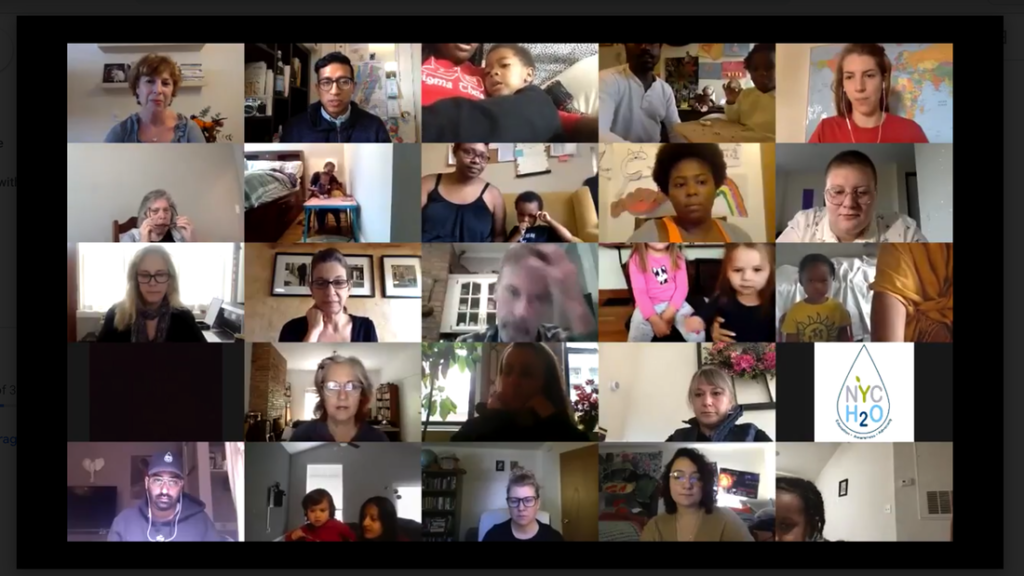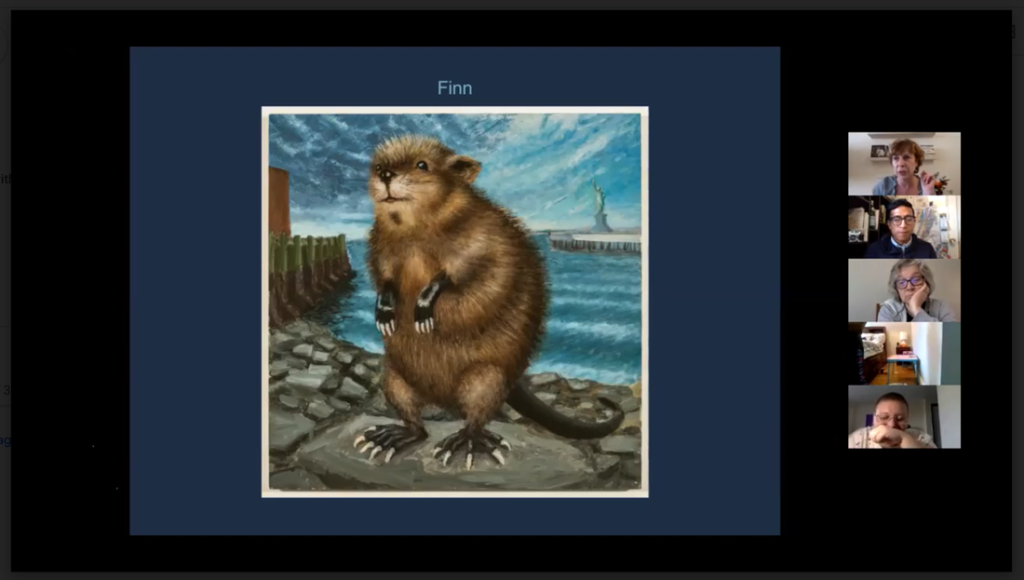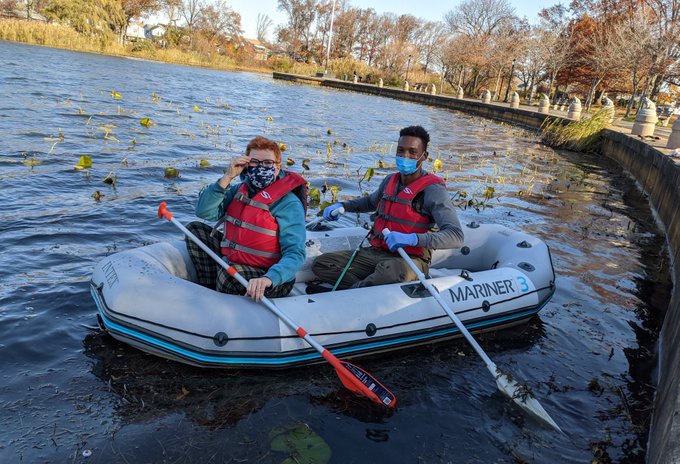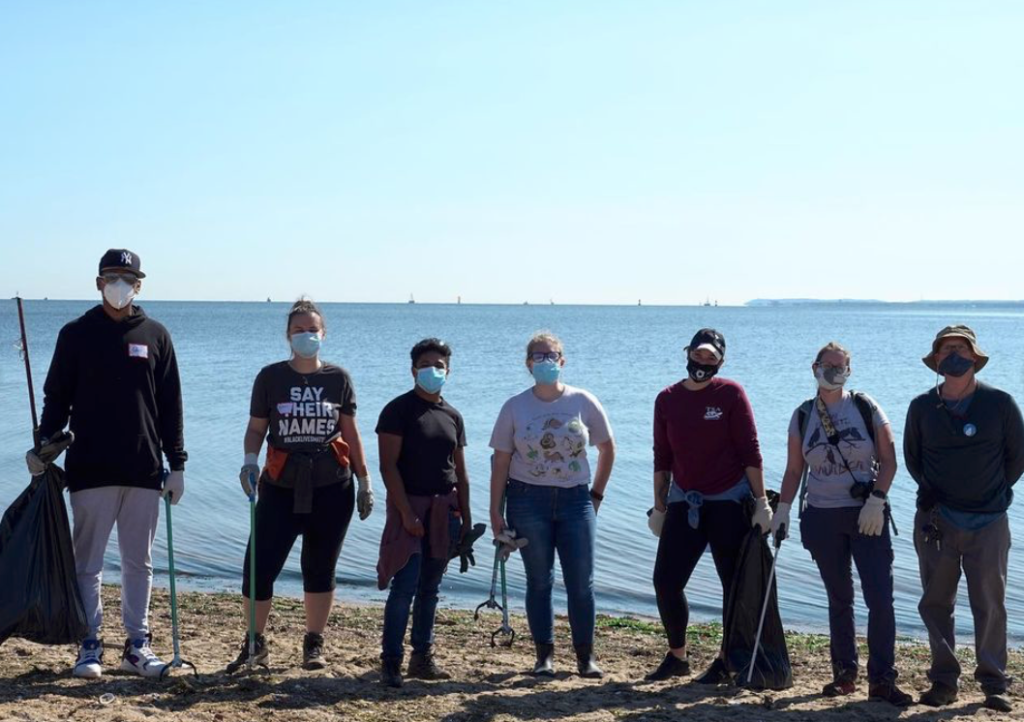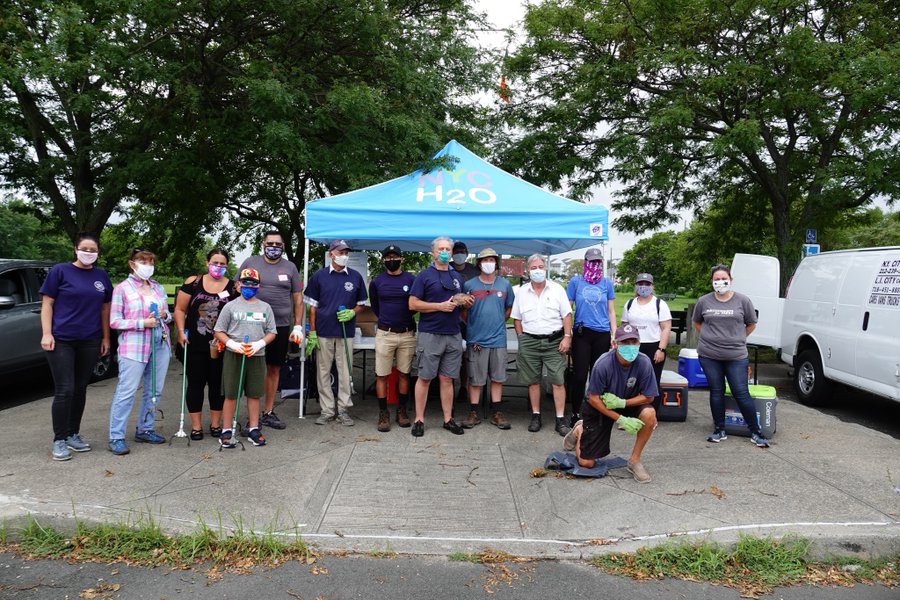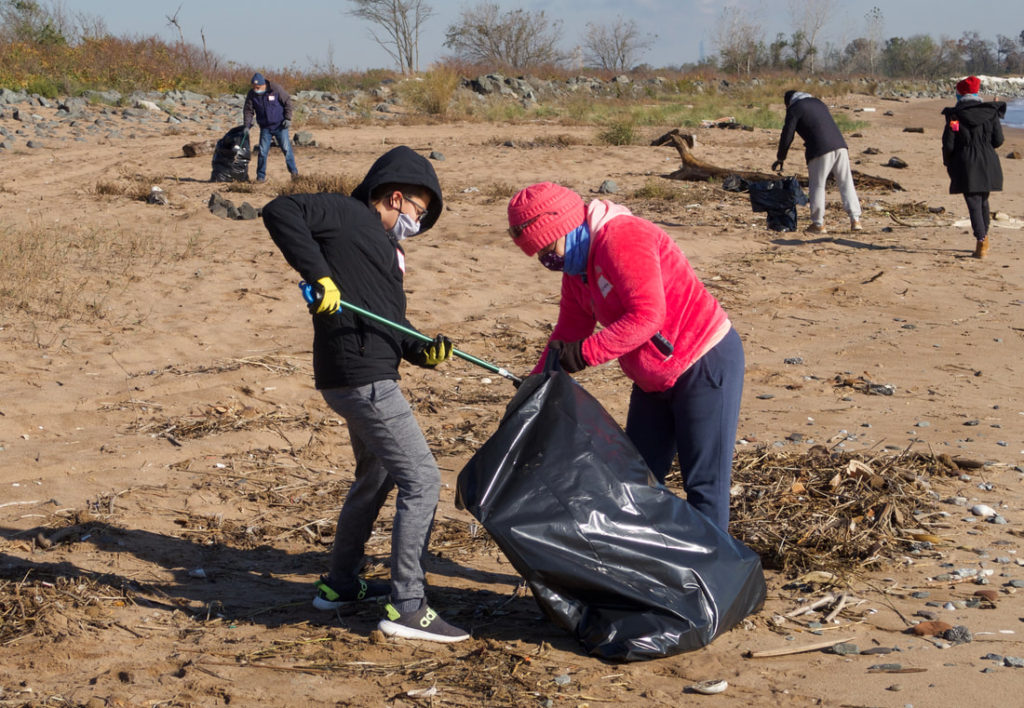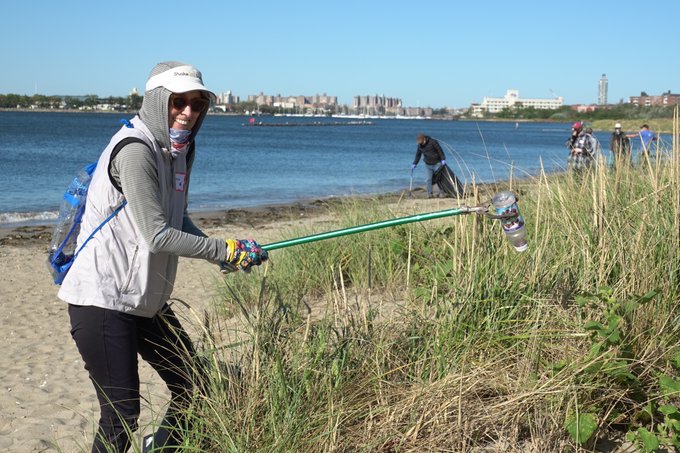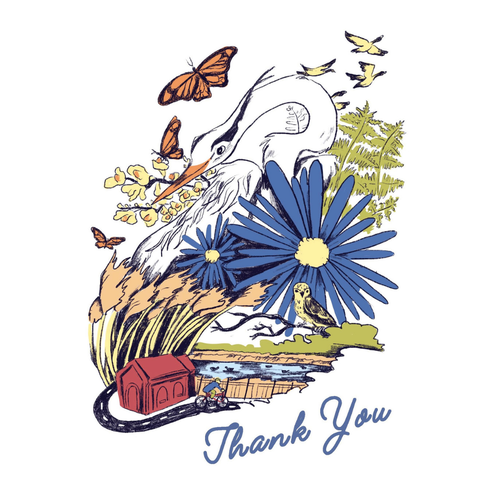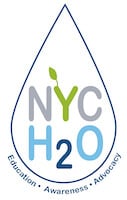Water Ecology & Engineering Field Trips & the NYC H2O Hub
Since February 2020, to accomplish its programs and activities during the pandemic, NYC H2O adapted to providing online learning and socially distanced events to continue to fulfill its mission and goals. We are appreciative of the generous support of the NYC City Council, our Board of Directors, donors, foundations, H2O members and hundreds of volunteers for making the following 2020 activities possible.
Most of the students who attend our in-person and virtual STEM field trips are from low-income Title I & III schools and have limited opportunities to explore urban parks and natural areas; many have never been out of their neighborhoods. COVID-19 has only exacerbated these pre-existing disparities and STEM educational gaps. In developing the NYC H2O Hub, we created a safe space to continue educating and inspiring students of all ages on the beauty and ecological importance of NYC’s water environment and engineering.
We developed the “NYC H2O Hub,” a suite of interactive online lessons using cutting edge Geographic Information System (GIS) technology. The lessons are presented using the “StoryMaps” application and allow students to manipulate modern and historical maps of water infrastructure sites which are embedded in illustrated narratives suitable for a variety of ages. There have been over 2,000 unique users of the Hub thus far.
Our StoryMaps can be found at: https://www.nych2ohub.org/
The Hub is organized into five main themes:
- Drinking water
- Sewer System, Stormwater Management
- Coastal Ecology
- Water Infrastructure Sites
- Independent activities
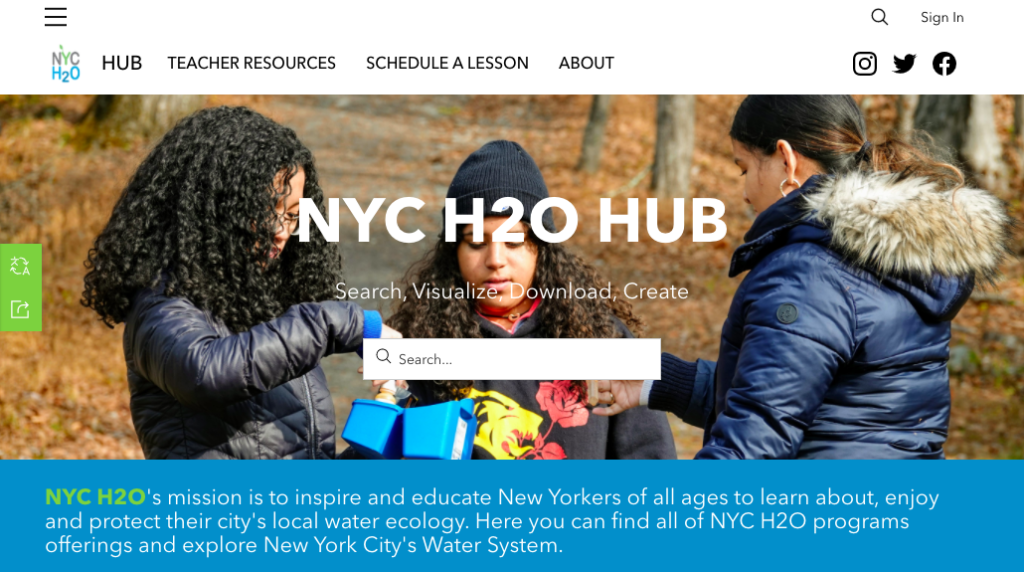
NYC H2O also developed a series of live lessons to be presented via Zoom, starting January 2021. You can view our virtual lesson descriptions HERE.
Our team built many interactive maps to engage students on the new virtual NYC H2O Hub, as well as created interactive independent activity sheets for different age groups. All Hub StoryMaps meet or exceed NYC/NYS STEM curricula standards.
With the shift to remote learning, we tried to ensure that students could continue to learn science in an engaging way. Students learned to read maps and situate their neighborhood relative to New York’s bodies of water and water sources. They learn about the nature of their city’s ecosystems, become stakeholders in the quality of the water, and are inspired to become future stewards of the city at a time of increasing climate impacts.
StoryMaps can be used in remote or in-person STEM classes. In addition to promoting the use of the Hub’s educational resources through social media and other outlets, we’ve held four teacher training sessions online to introduce educators to the Hub:
- 6/18/2020 – 13 attendees
- 7/16/2020 – 23 attendees
- 9/3/2020 (in partnership with the NYC DEP) – 50 attendees
- 11/19/2020 – 15 attendees
NYC H2O thanks the following City Council Members for their generous support of Water Ecology and Engineering Field Trips: Joe Borelli, Andy King, Robert Holden, Darma Diaz, Antonio Reynoso, Alan Maisel, Margaret Chin, Steven Matteo, Adrienne Adams, and Carlina Rivera. We also want to thank the NYC Department of Cultural Affairs, the City Parks Foundation, Lily Auchincloss Foundation, Van Ameringen Foundation, and Con Ed, for their support of our programs and New York City school children.
Ridgewood Reservoir Stewardship
For the last 5 years, NYC H2O has been leading a coalition of community groups and local residents to protect and preserve the Ridgewood Reservoir. We led walking tours of the Ridgewood Reservoir and organized volunteer stewardship events which safely brought local families outside to work on clean-ups and landscape restoration of native plants. The need for local greenspace and for safe impactful outdoor activities has grown significantly this year; New Yorkers want to give back. See Beach & Park Cleanups below.
Once the Parks Department granted permission to resume work in July, our stewardship programs at the Ridgewood Reservoir recommenced. These included socially distanced volunteer events held on 8/2/2020, 9/6/2020, 10/4/2020, 11/1/2020 and 11/29/2020. Attendance was limited to 25 participants and masks were required. The events were fully subscribed.
During these events, volunteers helped cultivate two pollinator gardens comprising an area of one acre. Volunteers removed invasive plants and planted native wildflowers including Milkweed, Purple Hyssop, and more. Volunteers also worked on a newly restored walking trail between the two eastern basins of the Reservoir, removing vines that were growing around the historic fence.
We also provided two walking tours of the Ridgewood Reservoir on October 24, 2020 and November 21. The walks were fully subscribed, masked and distanced.
We also recently added the Before & After page to our website, in order to show the great impact we have made on the Ridgewood Reservoir – Highland Park by working together with our community members and staff.
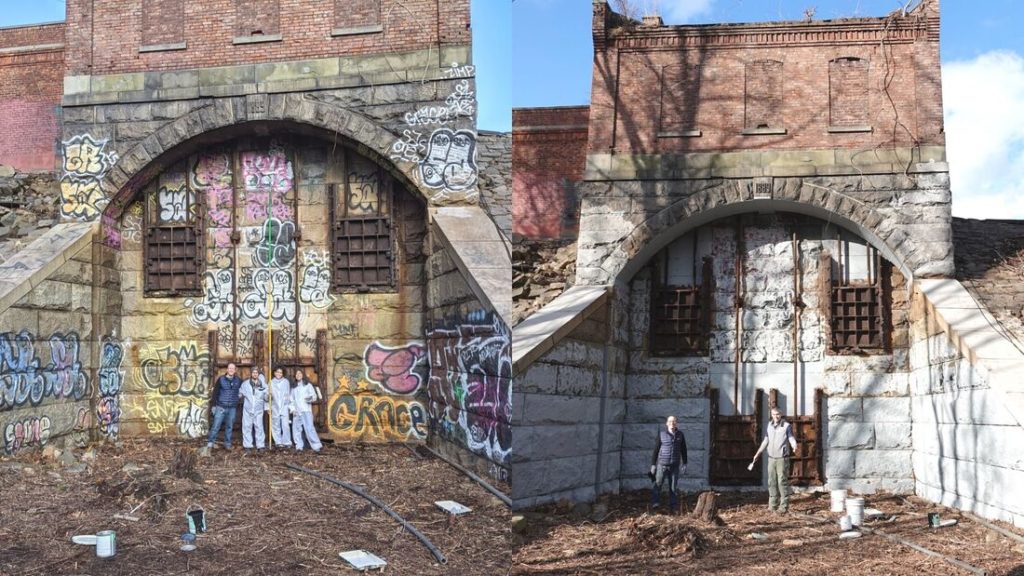
THANK YOU to City Council Member Robert Holden, Council Member Antonio Reynoso, Council Member Darma Diaz, Ridgewood Savings Bank, ATAX Ridgewood, and Patagonia for their generous support of our work at the Reservoir which allowed us to provide 6 free tours of the Reservoir for 60 community residents. We also thank the New York City Department of Parks for working with us to improve the Reservoir through citizen involvement.
We also thank the following elected officials who advocated for the Ridgewood Reservoir, amplifying the voices of many diverse community groups in both Brooklyn and Queens as to the importance of protecting the Reservoir while providing greater access to this ecological and cultural treasure. These include: Congress Members Nydia M. Velázquez and Grace Meng; Queens Borough President Melinda Katz, Brooklyn Borough President Eric Adams; Council Members Rafael Espinal, Antonio Reynoso and Robert Holden; Assembly Members Mike Miller, Cathy Nolan, Joe Lenthol, and Andy Hevesi; and State Senators Joe Addabbo, Michael Gianaris, and Julia Salazar.
Ridgewood Reservoir Community Access
We installed an exhibit about the Ridgewood Reservoir at the Queens Museum in March 2020. After the museum was temporarily closed due to the Covid-19 pandemic, we created an online gallery so people could appreciate the exhibit remotely. Now that the Queens Museum has been reopened, the exhibit has been extended through July 31, 2021!
You can view the Queens Museum’s page about the exhibit HERE.
You can view the virtual gallery of Ridgewood Reservoir for the 21st Century HERE
Events
In response to COVID-19, we had to shift many of our programs from in-person to virtual, both for schools and public audiences. All of these programs are provided free to the public.
On October 17, we partnered with artist Stacy Levy and Guardians of Flushing Bay for an outdoor, socially-distanced drawing program, “Drawing Water.” Using chalk paint we traced the flow of the historic marsh water at Flushing Bay in which 20 people attended.
We presented a live virtual reading of a new children’s book about the ecology of the Gowanus Canal titled “The Gowanus Muskrat”, with author Elizabeth Alpert on 10/27/20 which people attended via Zoom. You can watch the full virtual reading HERE.
In addition to these events, we also held Staten Island walking tours which explored areas with unique water infrastructure features and highlighted their cultural history.
Photographer and journalist Nathan Kensinger is curating a series of walking tours in southern Staten Island, highlighting the cultural and ecological history of the area. Thus far, three walking tours have been held, fully subscribed:
- Prince’s Bay and Lemon Creek Walking Tour – 9/26/2020
- Tappen’s Creek and Kreischerville Walking Tour – 10/5/2020
- Richmond Creek and Brookfield Park Walking Tour – 11/22/2020
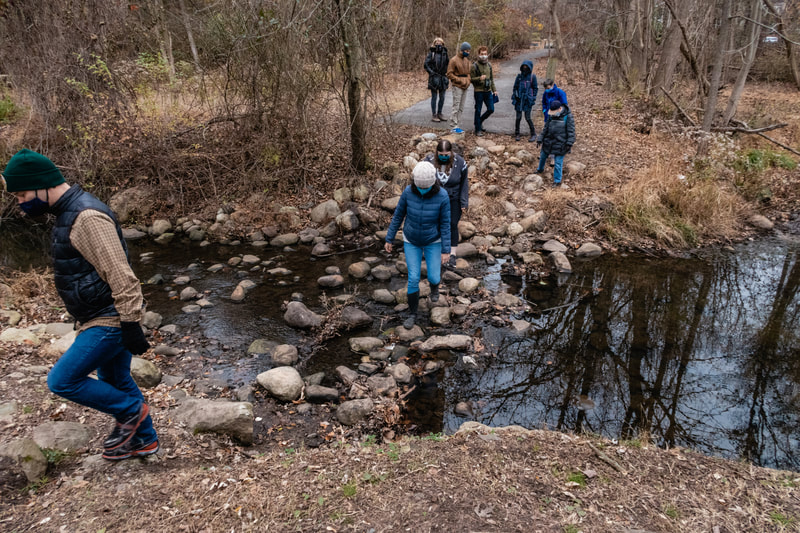
In 2021, we expect to reach 3,000 people directly through our live events and our website content.
Social & Environmental Justice
We hosted a Zoom webinar on environmental justice in the context of NYC public housing, given by environmental organizer Karen Blondel. As a long time resident of NYCHA’s the Red Hook Houses, Karen experienced firsthand the impact of the lack of proper roof maintenance in wreaking havoc on building residents in NYC public housing. She began organizing her community by collecting data about the problems residents faced in their efforts to rectify issues that ranged from moldy walls to water dripping down into the building’s apartments. We are also thankful to then-Council Member Ritchie Torres for his generous introduction and interest in the problems of this community.
Most of our STEM field trips—including our virtual field trips in 2020—serve students from low-income, predominantly Black, Hispanic and immigrant neighborhoods where there is less access to green space. By engaging these students with water engineering and ecology concepts, we hope to train a future generation of diverse environmental scientists and advocates who are equipped to use science to tackle injustice and environmental change. We know first hand that the transition to remote learning is especially difficult given existing disparities which have been exacerbated by COVID-19.
As educators, we believe that we have a responsibility to help correct inequities in access to environmental resources including parklands. The pandemic has disproportionately harmed NYC’s predominately Black, Hispanic and immigrant communities. While large outdoor green spaces have played a crucial role as safe places to socialize during the pandemic; such green spaces are less abundant in NYC’s predominantly nonwhite neighborhoods.
Our stewardship and advocacy work surrounding the Ridgewood Reservoir helps address the racial and other disparities in access to New York City’s parks. The Reservoir is located in Highland Park, which is one of the only large green spaces within walking distance of East New York, a predominantly Black neighborhood. As part of our work, we collaborate with local community groups whose needs are served through work at the Reservoir.
This summer, we released a statement emphasizing our solidarity with the fight against systemic racism and oppression of BIPOC (Black, Indigenous, and People of Color) communities. We outlined several actionable steps we are taking to further our commitment towards social and environmental justice:
- Working to create an urban environmental justice module in our Virtual Hub.
- Presenting a more inclusive history of NYC, its water system and its connection to equitable access to public health.
- Deepening our commitment to working with schools in under-served neighborhoods across the city.
- Amplifying the BIPOC voices within the field of Earth Sciences and environmental education in our programming and events.
Beach & Park Cleanups
We held six volunteer beach and park cleanups this year:
- Lemon Creek Beach Cleanup in Staten Island – August 8th
- Plumb Beach Cleanup in Brooklyn – September 19th
- Conference House Park Cleanup in Staten Island – October 3rd
- Oakwood Beach Cleanup in Staten Island – October 31st
- Baisley Pond Park Beach Cleanup in Queens – November 14th
- George Walker Jr. Park Cleanup in Brooklyn – December 12th
Altogether, we had 400+ volunteers–many of whom were students–remove 3 tons of trash from these five beautiful shoreline parks and wetlands!
THANK YOU to all of our partners who worked with us on beach and park cleanups:
- City Council Member Alan Maisel
- Natural Resources Protective Association (NRPA)
- NYC Parks
- NPS – Gateway National Recreation Area
- City Councilman Joe Borelli
- City Council Member Adrienne Adams
- Partnerships for Parks
- Staten Island Tech High School
- City Council Member Steven Matteo
- Jamaica Bay-Rockaway Parks Conservancy
- Engines for Change
- Surfrider NYC
- Staten Island Zoo
- City Parks Foundation
- Representative Mike McMahon
- St. Clare School
- Staten Island Borough President James Oddo
- Staten Island Deputy Borough President Ed Burke
Support NYC H2O
Your donation directly supports our free outdoor educational field trips as well as our virtual NYC H2O Hub for underserved school children (enrolled in Title I and III schools) in all five boroughs. We’ve been awarded a Platinum Seal from Guidestar, denoting the highest possible level of transparency. Please consider donating here to support our students in learning about the critical importance and beauty of New York City’s water through hands-on science learning.
Members are a critical part of our NYC H2O team: learn how you can make a difference by becoming a member here. At NYC H2O events, members are invited to meet with our speakers at pre-event gatherings when social-distancing is possible, and network with other members who care about shaping the future of New York City and educating its youngest generation. Members receive NYC H2O merchandise and other benefits such as event and walking tour discounts.
Thank You for Your Support!
Thanks again to all our sponsors and to all who support our work through donating, volunteering, and participating in NYC H2O programs such as virtual sketching events, virtual readings, and walking tours, or by attending our teacher education programs!

